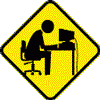This is true. If you have say 4 partitions on a drive and the drive fails. Those 4 partitions are lost and no way to retrieve the data short of a very expensive professional service. Even then no guarantee they will be able to get everything.
Separate hd for data is the most logical setup.
That way OS drive fails you only lose OS and programs.
Backup Backup BackupThe most important step any user can do to safe guard their contents.
Personally I say once a week but this will depend on the amount of new data you have.
You may do it every night if needed.
What I would suggest you do is to
Backup your
Data Files.For this I would suggest using a
External Hard Drive Enclosure. This will allow you to keep your
Important Data safe and
Separated from the main system in case of problems. The cost for this kind of
Backup System has come down a lot. I would suggest a
500 Gig capacity for your needs. Since you will only be
Backing Up Data Files Only this should be sufficient to do that for you. Follow the next two links to see examples of the price you will be looking at.
•
HERE•
HEREI suggest going to
Microsofts Backup Tutorial and follow the steps to do a
Backup to a
External Drive and also it will guide you on how to do a
Scheduled Backup even at night.
Another way you can do a
Backup is by using
DVD’s. This method is just as effective and can be done using the same steps as above.


















 Sign In
Sign In Create Account
Create Account

